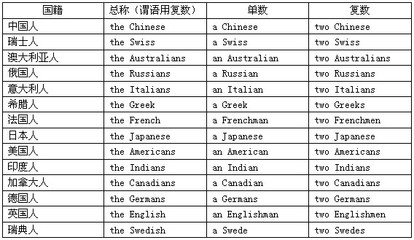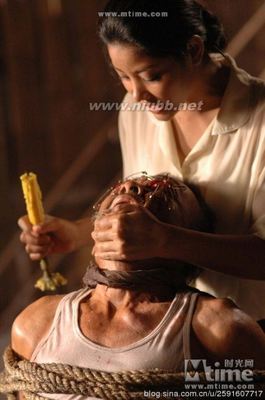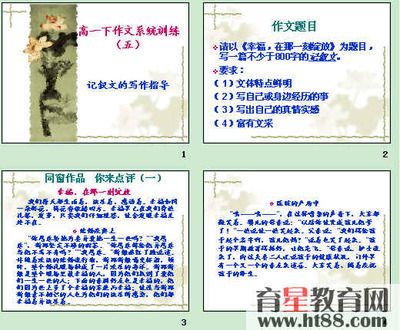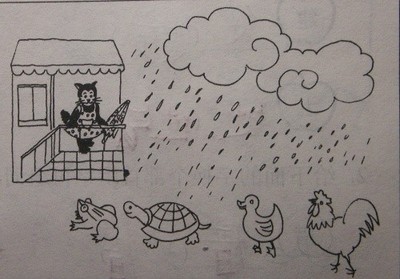(4)在表示数量的of结构中,如 a bit of garden,a kilometre ofrailway,a patchof road,two miles of bumpy road,a few square feet offloor,an inchof pencil,acres of lawn,two-hundred miles ofwall以及表示头衔、学位、地位的of结构中,如 the rank of general,the title ofhero,thepost of usher等,of后的名词具有抽象意义,用作不可数名词。
(5)在一些短语中,可数名词常失去可数名词的具体意义而发展为抽象意义,用作不可数名词。
a.The trees are now in flower.
b.There's no school tomorrow.
c.He's on holiday.
(6)有些名词既可作可数名词,又可用作不可数名词,但意义不一样,试比较:
a.The house comprises five rooms.(房间)
There is much room for improvement in our work.(余地)
b.China is a great socialist country.(国家)
It is very good country for growing rice.(地方)
c.I am going to move to a new house.(房子)
She keeps house for his uncle.(管家)
(7)英语中表示动物名称的名词是可数名词,而用来表示它们的肉时则是不可数名词。
a.I saw two little lambs.
I like to eat New Zealand lamb very much.
b.I caught two fish yesterday afternoon.
I like fish very much.
c.Don't count your chickens before they are hatched.
Do you like boiled chicken?
英语中有些动物名称和它们肉的名称的名词不是同一个词,但也适用这一规律,如cow(牛),beef(牛肉),sheep(羊),mutton(羊肉),pig(猪),pork(猪肉)。
(8)英语中用来表示物体的名称是可数名词,但用来表示该物体的物质名词则是不可数名词。
a.There is a huge pine in front of my house.
This box is made of pine.
b.I had an egg for my breakfast today.
Egg is my favourite dish.
(9)表示时间的名词,如day,morning,noon,night等,如果用来指天色,表示抽象的概念,不表示一天中的各段时间,用作不可数名词。
a.Morning is the best time for study.
b.Night falls.
c.When our part of the earth begins to turn away from thesun,wehave afternoon and evening and night.
此外,如果在单数可数名词前加上too much或too little时,可数名词则用作不可数名词,表示抽象意义。
d.He has too much family.他家务太重。
e.He seems to have too much mouth and too little ear.
似乎他自己讲得多,听别人的意见少。
(10)名词复数的不可数性
一般,只有可数名词才有复数,但也有一些复数形式是不可数
的,如:He used to sleep in my rooms when he came totown.这里rooms虽指一间以上的房间,但把各房间的总和看作一个单位,而并不指每
一房间,to sleep in my rooms当然不是说同时睡在多个房间。
All+多数普通名词结构:
a.I am all ears to hear their discussion.我很留意他们的讨论。
b.At the magic show the children were all eyes.
孩子们目不转睛地观看魔术表演。
这种结构表示性质到了极点。在该结构中,名词复数并不表示具体的两只耳朵、两只眼睛,而表示抽象概念,具有不可数性质,注意all不可改为both。还有一些名词,特别是与“婚丧、喜庆”有关的名词常用复数,但它们并不可数。
a.Congratulations!
b.Please give my best regards to your father.
c.We all filed past to pay our last respects to the remains ofLao Li.
不可数名词误用为可数名词
误:The passenger has left two baggages in the train.
正:two pieces of baggage
误:He gave me many good advices.
正:much good advice
有些名词容易被理解为可数名词,而实际上是不可数的,如work,news,chalk,paper,luggage,baggage,advice,fortune,weather,prose,china(瓷器),information,soap,toothpeste,property,homework,music,equipment,bread,toast,hearsay,fun,luck,clothing,merchandise,food等,如欲加上数的观念时,应加a piece of,an article of,a stroke of等等。
a.A wardrope is a piece of furniture.
b.She has bought a new article of clothing.
c.Man needs various kinds of food.
d.Two articles of merchandise were lost in the store.
e.What a stroke of luck I have!
其他例子
(1)误:There is still a room for improvement.
正:room
room作“余地、空间”解时为不可数名词。下列几句也是错的,须去掉其中的不定冠词。
a.You are a great fun.
b.We have a good weather today.
c.It is a great luck to meet you here.
d.The child can be a good company for me.
(2)误:I have a good news to tell you.
正:good news
news只可作不可数名词,其前可以用a piece/item/bit of,some/little/much修饰,如 apiece of bread,a piece of equipment,a piece of jew-elry,a shert ofpaper,a cake of soap,a bottle of ink,all ear of corn,an ar-ticle offurniture。
(3)误:He has recently found a work at bank.
正:a job
work当“工作、职业”解时,为不可数名词,work的复数形式可用于以下情形:
①复数形式既可用作单数,也可用作复数,当“工厂”解。
a.This works is the biggest factory in the city.
b.Those are chemical works.
②复数形式用作复数:
当“著作”解,如the works of Shakespeare。
当“工程、工事’解,如defence works。
当“奇迹”解,如 might works。
(4)误:He wrote with a chalk.
正:a piece of chalk
chalk是不可数名词,但当它指“各种粉笔”时,也可以有复数形式 chalks。
(5)误:Could you give me a paper to write the address on?
正:a piece of paper
paper表示“纸”时为不可数名词,但它表示“文件、考卷、报纸”时为可数名词。
(6)误:You have such a good fortune.
正:a piece of good fortune
fortune指“运气”时为不可数名词,但表示“财富、财产”时为可数名词,如:She has made afortune.
(7)误:It's not good to go out in such a bad weather.
正:bad weather
weather是不可数名词,但在某些习惯用语中,它常以复数形式出现,如 under allweathers(不论天气如何),in all weathers(不管某人命运)。
(8)误:Professor White asked me to write a prose.
正:a piece of prose
prose表示“散文”时,为不可数名词,但可用 in a prose表示“用散文形式写”。
(9)误:It's only a hearsay that the chairman is going toresign.
正:It's only hearsay
(10)误:The used car was in a good condition.
正:in good condition

condition指情况、健康情形时,为不可数名词,但指环境或条件时,常作可数名词。
a.Being a good skater is one of the conditions for getting onthe hock-ey team.作一个好的溜冰者是进入曲棍队的条件之一。
b.Poor working conditions caused the employees to go onstrike.
恶劣的工作环境使员工们罢工。
(11)误:Where are your baggages?
正:Where is your baggage?
(12)误:How many luggages do you have?
正:How much luggage
(13)误:The old often give good advices to the young.
正:advice
advice是不可数名词,须用 a piece of或 two/four/many piecesofadvice。当advice指“从远处来的消息”,尤指“商业信息”时,有复数形式advices。advice为名词,相应的动词为advise。
(14)误:He obtained many informations from his friends in thatgov-ernment agency.
正:a lot of information
(15)误:I have ordered new furnitures for the office.
正:furniture
(16)误:He checked in his luggages at the airport.
正:luggage
baggage和luggage一样,都做“行李”解,这两个词都是不可数名词,不能用复数:Where is yourbaggage?假如说到行李的件数,则是apiece of luggage/baggage,two/three…pieces ofluggage/baggage,这两词区别是luggage是旅客的一般行李,baggage则是笨重的行李,如军队的行李。
(17)误:The typhoon did many damages to the growing rice.
正:much damage
damage指“损害”时为不可数名词。当它指“损害赔偿”时,为可数名词:The insurance companyrefused to pay him damages.
(18)误:He is a man of noble characters.
正:character
character作“品格”解时,只能用单数形式,为不可数名词。若character当书中或戏中的“人物、角色”解或指象中文中的“汉字”解时,为可数名词:ManyAmericans speak Mandarin fairly well,but theyfind it difficult torecognize the characters.
(19)误:I had my hairs cut yesterday afternoon.
正:hair
hair泛指头发时通常作不可数名词,但说到几根头发时,却可用hairs:There are two white hairs onhis coat.
(20)误:She had to make a choice between love and breads.
正:bread
bread是不可数名词,如要说一片面包要用 a piece of bread,一条面包要说 a loaf ofbread。bread and butter(涂奶油的面包)应当作一个词看待,要用单数:Here is bread andbutter.
(21)误:Is it good to eat some fruits after lunch.
正:fruit
fruit通指水果时,常作不可数名词,但当它表示各种不同的水果时,可用复数:Taiwan producesbanana,oranges and other fruits.
(22)误:Tooth decay is the most common disease of humanities.
正:humanity
当humanity泛指“人类”时,为不可数名词,当humanities指“人文学科”(studies such asliterature,the languages of ancient GreeceandRome,history,etc.)时,为可数名词,常以复数形式出现。
(23)误:A refrigerator is a property.
正:a piece of property
property表示“财产”时是不可数名词,但它表示“地产”时是可数名词:He has a property in thecountry.
(24)误:Please give me a buttered-toast.
正:a slice of buttered-toast
toast表示“烤面包”时是不可数名词,但在 as warm as a toast(暖烘烘的)中的 a toast不可改为 apiece of toast。另外,在表示“祝酒”或“干杯”时,toast是可数名词:Let's drink atoast!干杯!
另外,表示“总称”或“集合体”的名词没有复数形式,常见的有:machinery,vocabulary,stationery,scenery,jewellery,clothing,furniture,poetry,cutlery,porcelain,hardware,artillery,mail等等。
(25)误:The workers have installed a lot of machineries.
正:machinery
表示“一台机器”可用a piece of machinery或a machine。
(26)误:Mr.Li has five thousand vocabularies.
正:a vocabulary of five thousand words
一个人或一种语言只可能有其固定词汇量,所以vocabulary应为单数。
(27)误I bought a lot of stationeries last semester.
正:stationery
(28)误:Do you like such a scenery?
正:scenery/a scene
(29)误:Do you like reading poetries?
正:poetry/poems
说“一首诗”用a piece of poetry或a poem。
(30)误:We are going to buy some porcelains.
正:porcelain
porcelain是瓷器的总称,不可变为复数。说“一件瓷器”用 a pieceof porcelain,如 a spoon,abowl,a cup等。
(31)误:That business man deals in hardwares.
正:hardware
hardware是集体名词,不可变为复数,说“一件五金器具”用apiece of hardware,如 a pen,anail,a lock等。
(32)误:Our soldiers captured ten artilleries.
正:ten pieces of artillery
artillery是大炮的总称,为不可数名词,如要说“一门大炮”需要用 a piece of artillery或 acannon。
(33)误:We asked the postman to forward our mails.
正:mail
mail是不可数名词,它常和the或物主代词连用,表示一批邮件,如说“一件邮件”要用a piece ofmail,但表示各种邮件时,mail可有复数形式:The ship sank and the mails were lost.
(34)误:The crossbow is a medieval weaponry built in such a way astogive it greater strength than an ordinary bow.
正:weapon
weaponry是不可数名词,在意义上等于weapons,为武器的总称,如指一件武器应用 a piece ofweaponry或 a weapon,相应的还有poet-ry,poem,jewelry,jewel,clothing,garment。
可数名词误用为不可数名词
误:Our school was burned to ash.
正:ashes
英语中有些可数名词在汉语意思上习惯被误解为不可数名词,或某些不可数名词在惯用法和特定条件下用作可数名词。如:beburned/reducedto ashes(被烧为灰烬)为惯用语,其中ash用复数形式。
其他例子:
(1)误:I saw an old man with long beard walk into the house.
正:with a long beard
beard是一可数名词,若指某人的一把胡子时要用不定冠词。说人的胡子时可有复数形式:
a.Men and goats have beards.
b.He no longer wears a beard.
hair却不同于beard,hair指一头头发时为不可数名词,而指一根或几根头发时为可数名词,如find a hair inthe soup。
c.My hair has grown very long.
d.Ten years passed;I found she had a few white hairs.
此外,一些文学作品中表示非常之多的不可数物质名词也常有复数形式,如 the sands of the desert,thesnows and frosts of the Antac-tics,waters of the East Lake。
(2)误:He described his wild experience in many foreigncountries.
正:experiences
experience指“something that happens to one”(个人体验的事情)时,用作可数名词。
(3)误:Meat,eggs and nuts are food that is high in protein.
正:foods
指多种食物时,必须用foods;泛指一般的食物时,则以food表示:They asked for food.
(4)误:All his belonging was damaged by fire.
正:All his belogings were
belonging指“所有物、财产”时常用复数形式。
(5)误:They tried to save their life.
正:lives
life表示“生命”时,为可数名词,其复数形式是lives。
(6)误:Give our best regard to professor Miller.
正:regards
regard作“问候”解时,常以复数形式出现。
(7)误:The children were waiting for their turn to ride in aneighteenth century stage coach.
正:turns
turn在本句中为可数名词。注意下列短语中turn的单复数用法:in one's turn(依次),in turn(轮流),byturns(轮流),take turns(轮流)。
(8)误:Our wage is getting higher.
正:Our wages are
wage(工资)一般为可数名词,常作复数。
可数名词单复数形式的误用
误:The aircraft carrier is carrying two aircrafts on theboard.
正:aircraft
有些可数名词单复数形式常易发生错误,aircraft是单复数同形的集合名词,on board意为“在船上”。
其他例子:
(1)误:American withdrew from Vietnam.
正:Americans
American为可数名词,应加冠词或加-s表示。本句表示许多美国人,故用复数形式Americans。
各国人单复数形式有相同的,也有不相同的,现将一些较大国家的人的单数、复数和全体的表示方法列表如下:
单数复数全体
ChineseChinesethe Chinese
EnglishmanEnglishmenthe English
AmericanAmericansthe Americans
FrenchmanFrenchmenthe French
RussianRrssiansthe Russians
ItalianItaliansthe Italians
JapaneseJapanesetheJapanese
GermanGermanstheGermans
IndianIndiansthe Indians
KoreanKoreansthe Koreans
PortuguesePortuguesethe Portuguese
SpaniardSpaniardsthe Spaniards
Dutchman(荷兰人)Dutchmenthe Dutch
HollanderHollandersthe Dutch
GreekGreeksthe Greeks
SwissSwisstheSwis
DaneDanesthe Danes
SwedeSwedesthe Swedes
NorwegianNorwegiansthe Norwegians
EgyptianEgyptiansthe Egyptians
TurkTurksthe Turks
(2)误:There were a huge audiences at thatconcert.
正:audience
audience,crowd,family,class等都为集合名词,一般没有复数形式。若指一个集体时,常加单数动词,若强调每个成员时,接复数动词。必须注意families(许多家庭),classes(许多班级)的意思与上述不一样。
(3)误:Carps are expensive here.
正:Carp
carp作集合名词用,表示所有的鲤鱼。表示两种或两种以上不同的鲤鱼时,用carps。
(4)误:Two Chineses and one Italian werethere.
正:Two Chinese
Chinese,Japanese,Swiss等均为单复数同形。
(5)误:I made a friend with a young lady.
正:friends
make/keep friends with为惯用语,形成 friend的关系要靠双方。
a.He is great friends with me.他和我很要好。
b.He is a friend of mine.他是我的一个好朋友。
(6)误:Somebody's scissor is under my desk.
正:somebody's scissors are
scissor的组成有两部分,故用复数形式,常见的有:chopsticks,glasses,socks,stockings。
(7)误:Your cloth is a perfect fit.
正:Your clothes are
colthes指“衣服、服装”,作复数用,而cloth是不可数名词,指“做衣服的布料”。
(8)误:Rain and snow are a phenomenon of the weather.
正:phenomena
rain,snow分别为天气的现象,故不能用单数形式。
(9)误:The boy took a great pain to assemble the model airplaneneatly.
正:great pains
take pains(费力、努力)为惯用语,注意要用pains。
(10)误:Her dress is extremely behind the time.
正:behind the times
behind the times意为“落伍”,是惯用语,behind time意为“迟了,晚了”:My watch isfive minutes behind time.at times意为“偶尔,有时”,all thetime意为“一直、始终”。当time指某一特定时间或时期时,用单数;in Lincoln's time,at Christmastime。
(11)误:The universitry president shook hand with the visitors onebyone.
正:hands
握手也是出自双方的动作,hand习惯用复数,与此有关的习惯用语也大多用复数,如 by the hands of(经…之手),inthe hands of(交托给),on one's hands(由…负责照管),lay hands on(抓住),washone'shands of(洗手不干),还应注意:make up one's minds(下决心),ex-changelessons(互教互学),join hands(联手),change hands(转手、易手)等习惯用语。
(12)误:I just bought a trouser.
正:a pair of trousers
注意许多由双边、多边或几个部分组成的物体名词要用复数形式,如:breeches,scissors,shears.knickers,pants,shorts,drawers,clothes,pyjamas,pliers,pincers等,这类名词还常和a pair of等连用。但当这些名词用作定语时要用单数,如 a trouser leg,a card table等。
(13)误:His speech was highly spoken by a large number ofaudience.
正:a large audience
andience指听众或观众的整体,可以用作单数,也可用作复数:The audience were/was enjoyingevery minute of the show.它不能用来指单个的人,因而只能用 a large audience表示“听众多”,用a smallandience表示“听众少”,a large number of audiences表示“许多批听众”。
 爱华网
爱华网



